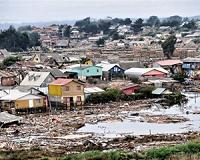| . |  |
. |
Port-Au-Prince (AFP) March 29, 2010 Haiti's earthquake victims are still reliving the horror of the January 12 disaster, and the trauma is forcing out suppressed memories of rape and years of domestic abuse. At the front-line of the battle to stitch up the emotional scars of a shattered Port-au-Prince populace, the impressive 28-year old Haitian psychologist Djenane Marhlen Jean Charles sets about mending tortured minds. Calm and professional, she runs a team of Medecins Sans Frontieres (MSF) trauma specialists at a tent city for more than 40,000 quake survivors that has sprung up at the Petionville Golf Club. "A lot of people are anxious and frightened of reliving the earthquake. They have physical complaints, headaches, palpitations, stomach cramps," Jean Charles told AFP. "People who lost family or friends feel guilty because they didn't die with their relatives or they didn't do enough to save them. A lot of them didn't see the bodies of their dead relatives so it's difficult for them to get over it." Many are overwhelmed by their surreal post-quake existence, they have lost everything, they are uncertain about the future, they have no idea how long they can stay at the camp, they don't know how to cope. "They feel completely lost in this situation and it takes time to work with them so they can get over it and see the light again," explained Jean Charles. The camp is at high-risk from floods as the rainy season approaches and the United Nations is trying to get people to move back to their homes or relocate to safer sites in and around the capital. The UN may be providing people with options, but Jean Charles said the majority of survivors feel helpless, lack initiative and are waiting for someone to tell them what to do. "The people don't know what will happen to them, they have not been informed if they can stay or not, if they will be displaced or not." There is increasing concern about rape in the camps and human rights group Amnesty International published a stark assessment this week, saying thousands of women were being abused. "Sexual violence is widely present in camps where some of Haiti's most vulnerable live," said researcher Chiara Liguori. "It was already a major concern in the country before the earthquake but the situation in which displaced people are living exposes women and girls to even greater risks." Jean Charles knew of only one rape at the Petionville Golf Club, but said many young women had suffered domestic violence within their families for years. One girl broke down during counseling as she recounted how she had been raped, abused and hit for years before the quake by family members. "She came back a second time and gave feedback from the first session, saying she was very grateful and relieved that she could finally speak with somebody. She is still coming," said Jean Charles. "I am used to seeing victims of sexual violence. It's important to give them space so that they can speak and so that there is somebody who is not judging them so they feel comfortable." MSF teams have started going around the camps with loud-hailers and placards to summon people to tent sessions where they can share their experiences. At an MSF-run hospital in the Cite Soleil slum, 33-year-old psychologist Katarina Brock said a lot of people were coming and more and more survivors were willing to talk. "It's very good that people are willing to share their experience, especially in groups," said Brock. "Others have been in a similar situation and they can share different ideas on how to cope and what you can do. "If they are having nightmares of flashbacks, they are just normal reactions to what they've been through, and to hear others that have the same problems, it helps them realize it's not just me that's crazy." The head of the criminal intelligence unit for the UN police, Michel Martin, said it was extremely difficult to clamp down on abuse in the camps. "This is a very unique, particular situation where you have thousands of people camping in an area where it is difficult to move around. You've got ropes, you've got poles. At night, especially, it is very, very difficult." At the Petionville Golf Club, Jean Charles prepared her team for the next round of patients, smiling as she said that despite all the nightmares there was still hope. "There is the dream that there will be a new Haiti, that all Haiti's problems will be resolved, with good schools, without violence, with basic social services."
Share This Article With Planet Earth
Related Links Bringing Order To A World Of Disasters A world of storm and tempest When the Earth Quakes
 Merchants start from scratch in tsunami-hit Chilean town
Merchants start from scratch in tsunami-hit Chilean townTalcahuano, Chile (AFP) March 27, 2010 Merchants in this port city are struggling to recover a month after Chile's monster earthquake, dealing with destroyed buildings, mud-caked stores and merchandise depleted from looting. Concepcion and the nearby port of Talcahuano, with a combined population of half a million, along with the town of Constitucion suffered the heaviest damage in the 8.8-magnitude quake and ensuing tsunami, whi ... read more |
|
| The content herein, unless otherwise known to be public domain, are Copyright 1995-2010 - SpaceDaily. AFP and UPI Wire Stories are copyright Agence France-Presse and United Press International. ESA Portal Reports are copyright European Space Agency. All NASA sourced material is public domain. Additional copyrights may apply in whole or part to other bona fide parties. Advertising does not imply endorsement,agreement or approval of any opinions, statements or information provided by SpaceDaily on any Web page published or hosted by SpaceDaily. Privacy Statement |